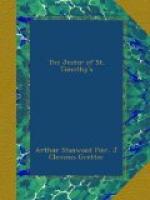He spent a mournful hour in his room; then, hearing footsteps on the stairs, he closed his door. The boys were returning from the field; he felt sure there would be remarks about him by Westby and Morrill and other Corinthians up and down the corridor, and he preferred not to hear them. To his surprise there was rather less disturbance than usual; perhaps the boys were too tired after their exciting and active afternoon to indulge in noisy skylarking. So Irving did not have to emerge from his solitude until the supper bell rang. Even then he waited until all the boys had passed his door and were clattering down the stairs. Yet as he descended, Westby’s indignant voice floated up to him,—
“Just because I guyed him—he felt he had to get even.”
At supper Westby did not look at Irving. One of the boys, Blake, made a comment; he said,—
“That was a mighty good race you ran, Westby; hard luck you were handicapped.”
“You can call it hard luck if you want,” said Westby.
“How did it happen, anyway?” Blake asked, quite innocently.
“Oh, don’t ask me,” said Westby.
Three or four of the boys who did know glanced slyly at Irving, and Irving, though he had meant to say nothing, spoke up; there was electricity in the air.
“Westby was unfortunate enough to foul Flack at the start; that was all there was to it,” he said. “I saw it and set him back a yard. I was under the impression that in case of foul a penalty had to be imposed—and I made the penalty as light as possible.”
He felt that this statement ought to appease any reasonable boy. But Westby was not in a reasonable mood. He paid no attention to Irving; he addressed the table.
“I told Scarborough he might have known things would be botched somehow.”
“Why?” asked Blake.
“Oh, you’ve got to have officials who know their business.”
There was an interval of silence at the table; Westby, having fired his shot, sat straight, with cheeks flushed, looking across at Blake.
“Westby feels that he has had provocation and therefore may be rude.” Irving spoke at last with calmness. “It’s true that I never officiated before at any races. At the same time, I don’t believe I did anything which some experienced officials would not have done. There are probably a good many who believe in penalizing a runner for clumsy and stupid interference as well as for deliberate intent to foul.”
He had spoken mildly; he did not even emphasize the words “clumsy and stupid.” But the retort went home; the Pythians at the table,—of whom Blake was one,—chuckled; and Westby, with a deeper shade of crimson on his face and a sudden compression of his lips, lowered his eyes.




